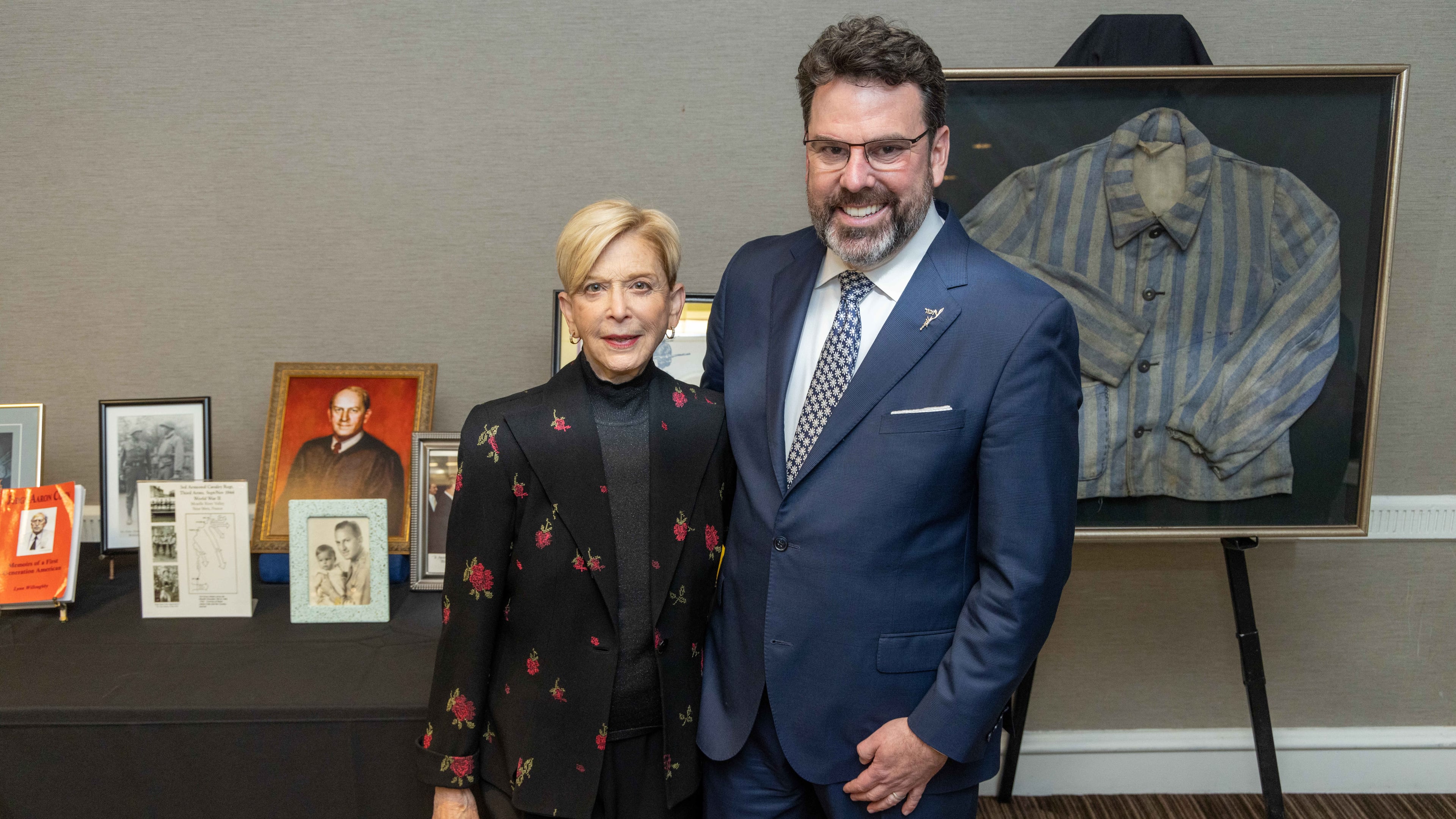Doctor, patient discover mutual connection to Holocaust

Atlanta orthopedist Dr. Reuben Sloan decided early in his career to emulate his mentor by getting to know his patients, not just what ails them.
Reuben Sloan, 58, says that decision made him a better doctor and led him to a revelation that would change his life.
In July 2012, Reuben Sloan was meeting with patient Gail Cohn and asked about her father, the well-known and respected juvenile court Judge Aaron Cohn of Columbus.
Gail Cohn told him that her father had died recently and that the Holocaust exhibit in the World War II section at the National Infantry Museum near Fort Benning was about to be dedicated in his honor.
As they talked, the two learned they had a much more fascinating connection than the one of doctor-patient.
Gail Cohn’s father had been part of the 3rd Calvary Regiment of General George S. Patton’s 3rd Armored Division and had liberated thousands of Jews at a subcamp of the German concentration camp Mauthausen in Ebensee, Austria.
Reuben Sloan’s father, a Polish Jew born Icek Slodowski, had spent more than a year at the camp doing hard labor until he was freed by Patton’s troops as the war in Europe was coming to an end in 1945.

“My jaw dropped. We just figured out that her father liberated my father and got him out of that hell he was living,” Reuben Sloan said, recalling that conversation of more than a decade ago.
“We hugged each other, and tears were shed after we realized our newly discovered connection, and, more importantly, our fathers’ corresponding angles.”

Lives intersected
Reuben Sloan is convinced that the two fathers came face to face and even spoke during what must have been a chaotic scene as thousands – most of them starving – were freed from Ebensee. He bases this on a relative’s account in 2021 of a conversation in which his father said he admired one of Patton’s majors who was in the calvary and spoke Yiddish. That describes Aaron Cohn to a T, Reuben Sloan said.
“We don’t know with absolute certainty,” he said. “Who else could it be? All the dots connect.”
Both men were dramatically affected by the war, though Icek Slodowski, who later changed his name to Erving Sloan, talked very little about his experiences, his son said.

He lost his entire family – his parents and four siblings – and well over 100 other relatives to the Holocaust, Reuben Sloan said.
Aaron Cohn was committed to righting some of the wrongs he saw in the war, daughter Gail Cohn said. That played out in his efforts as local chief of voter registration in the Civil Rights Movement to engage Black people in the process, having seen in the war the dehumanization of minorities, she said.
Aaron Cohn devoted most of his life to giving second chances to juveniles in Muscogee County in memory of 1.5 million Jewish children who were slaughtered in the war, Gail Cohn said. He retired as the longest-serving and oldest juvenile court judge in the nation and has a school and a youth detention center in the Columbus area named for him.
“He had great lessons from the Holocaust, and he always used to tell me: ‘Gail, life is not a popularity contest. It is about being fair and having a moral code,” she said. “He meant having a moral code without regard for race, religion, sexual orientation, or station in life, and he lived those values.”
Reuben Sloan said his father was a lifelong collector of watches, coins, automobiles and anything of value. Later in life, his father began to hoard, sadly a trait common to Holocaust survivors, he said.
Erving Sloan owned a popular restaurant for decades in Watts, an area of South Central Los Angeles that gained widespread notoriety for fatal race riots in 1965. That was likely a holdover from his memories of starving at the Lodz ghetto and concentration camps, his son said. The family home in L.A. always had an abundance of food, some held in refrigerators on the porch, he said.
Since early 2022, Gail Cohn and Reuben Sloan have given speeches about the intersection of their father’s lives at Ebensee. They’ve spoken at the Hughston Clinic in Columbus, where Reuben Sloan completed a sports medicine fellowship and learned from clinic founder and mentor Jack C. Hughston the importance of doctors getting to know their patients. They’ve spoken at the National Infantry Museum, The William Breman Jewish Heritage Museum in Atlanta, and at events hosted by Resurgens Orthopaedics, where Reuben Sloan works.
Both Reuben Sloan and Gail Cohn say they are willing to go pretty much anywhere to share their story.
“Remember the adage that all it takes for evil to triumph is for good people to do nothing,” Gail Cohn said. “So for me, it’s about standing up against injustice and not normalizing hate, as was done in Nazi Germany.”
MORE DETAILS
Aaron Cohn
Born: March 3, 1916
Died: July 4, 2012
A native and lifelong resident of Columbus
Icek Slodowski, aka Erving Sloan
Born: Aug. 15, 1925
Died: April 26, 2008
A native of Poland who immigrated to Los Angeles
